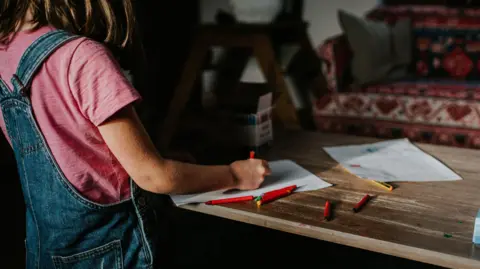Landmark bill seeks to keep children safe, says Phillipson
 Getty Images
Getty ImagesEducation Secretary Bridget Phillipson has told the BBC that the introduction of a "landmark" children's bill "will seek to keep children safe".
The bill was put forward to Parliament on the same day as Sara Sharif's father and stepmother were sentenced for her murder.
The 10-year-old victim was removed from primary school in order to be home-educated four months before she died.
A register which identifies children in England who are not currently attending school will form part of the bill, as well as increased powers for councils.
Sara's father and stepmother were sentenced to life in prison:
- Urfan Sharif, 43, must serve a minimum of 40 years
- Beinash Batool, 30, must serve a minimum of 33
Mr Justice Cavanagh said the events in the case "inevitably raise questions" about whether more could have been done to prevent Sara's death and it "brings into sharp relief" the dangers of unsupervised home-schooling for vulnerable children.
The Children's Wellbeing and Schools Bill will make sure that teachers and schools are always involved in decisions around safeguarding children in their area, and that if a child's home environment is assessed as unsuitable or unsafe, local authorities have the power to intervene.
A unique identifier number will be given to children across services, similar to an adult's national insurance number.
'Work together'
Phillipson told BBC Radio 4's Today programme the government wanted "everyone pulling together to keep children safe".
The unique identifier would enable information held by different services, such as health and education, to be shared between them - to stop vulnerable children falling through the cracks, the education secretary said.
"It's about police, schools, children's social care."
"The measures today will require those agencies to work together much more effectively to keep children safe."
Under the government's plans, parents will no longer have an automatic right to educate their children at home if their child is under a child protection plan, and will have to acquire the local council's permission first.
The previous government had also proposed creating a register of children who are not in school.
But the Children's Charities Coalition, representing Action for Children, Barnardo's, the National Children's Bureau, the National Society for the Prevention of Cruelty to Children (NSPCC), and The Children's Society, said: "The money announced today falls far short of what's needed.
"Children and families desperately need - and deserve - sustained investment in early help services, mental-health support and children's social care.
"This needs to be underpinned by an ambitious strategy to tackle child poverty."
'Attendance challenges'
The number of children being home-educated in England has risen by 20% this year, according to the most recent government figures.
The Department for Education says knowledge of where children are will enable councils to ensure a high-quality education is being provided, and to deliver the necessary support.
The Local Government Association, which represents councils, has asked for the new register to come with additional powers.
"[The register] must be combined with powers for councils to meet face-to-face with children, which is vital to allow councils to ensure children are receiving a suitable education in a safe environment," said councillor Arooj Shah, chair of the Children and Young People Board.
But not everyone agrees with plans for a register.
"International research is clear that introducing registers for home-educated children makes no positive difference whatsoever to those children's outcomes, and leads to fewer being known to public bodies," Wendy Charles-Warner, chair of home education charity Education Otherwise, told the BBC.
"Promises of support have been made for about fifteen years now and have yet to materialise.
"Over 100,000 children are already registered with local authorities as home-educated, new legislation is not needed to offer those families requested support," she added.
There have been several attempts to introduce a register over the last decade by successive governments, but all have failed.
Phillipson told the BBC's Breakfast programme she was worried about the "big increase" in home-schooling.
"I respect the rights of parents to seek to home-educate their children," she said.
"My concern is that some parents are choosing to opt out of the system because they feel their children's needs are not being met.
"We face some really big and stark attendance challenges."
The Education Policy Institute warned that up to 300,000 children may be missing from education entirely.
Children's Commissioner Dame Rachel de Souza said she had "called on successive governments to introduce a unique identifying number for children and a register of all children not in school".
"Writing these two landmark measures into law will be of huge significance for any child currently at risk of harm in this country.
"It must now be supported by proper data-sharing between organisations so no child can become invisible in the system."
The general secretary at the school leaders' union NAHT, Paul Whiteman, also welcomed the bill, saying they had "long called for a register of pupils who are not in school" and "it is very positive to see that this important safeguarding measure is finally being taken, after years of delay".
The register is expected to come into force in 2025.
First unveiled in the King's Speech, the Children's Wellbeing and Schools Bill is wide-ranging in its proposals, including free breakfast clubs in all primary schools and legislation to limit branded uniform items.
